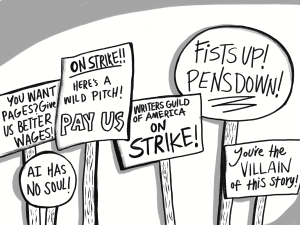
Due to an unresolved disagreement with the Alliance of Motion Picture and Television Producers regarding better working conditions and payment, the Writer’s Guild of America went on strike beginning May 2. Two months later on July 14, the Screen Actors Guild and American Federation of Television and Radio Artists aligned themselves with WGA and their goals by joining the picket lines.
The WGA and SAG-AFTRA strike has meant a pause in work for many professional writers and actors with the aim of securing, among other things, better pay rates. At the University of Mississippi, where the next generation of professionals are trained and educated through UM’s Theatre and Film department, the strike has given students and professors alike an opportunity to think more deeply about their industry.
Sophomore film production major Arkasha McGinness expressed his surprise that the strikes occurred but shared that he has learned a lot more about the inner workings of the industry as an aspiring screenwriter and filmmaker.
“It’s clear that writers are not receiving the amount of money they are owed when their work reaches millions,” McGinness said.
These strikes have caused a pause in development and conception of new projects in Hollywood, including films, television shows, video games and the like. McGinness hopes that as a result of the strikes, the public will have a greater awareness of the work writers and actors put into their work in the film industry.
Don Waller, a senior who studies theater, journalism and business, discussed his knowledge of the current compensation model when it comes to streaming services.
“With this new age of streaming services, there’s been no rules set up so that the writers and actors get their fair cut,” Waller said. “They would be making, per episode, change, you know? Scraps compared to what the streaming services were making.”
Waller is referencing a viral video of actress Kimiko Glenn from Orange is the New Black revealing how little in residuals actors make from hit TV shows by showing her own paycheck from the famous series. Despite playing a prominent role on “on a major show that defined a generation,” Glenn had to keep a day job to stay afloat financially.
Waller regards writers as the backbone of the entertainment industry and thinks that streaming services like Netflix have fallen short when it comes to their treatment of workers, particularly with the emergence of AI and how companies are starting to use it to replace both writers and actors.
Waller declared his support of both unions and stressed the importance of the strikes.
“When I become a part of the industry I want to have the protections that actors and writers deserve,” Waller said.
UM Theatre professor and active SAG-AFTRA member Dan Stearns shared his insight into the ongoing strike. Stearns served as a delegate for New Orleans Local, which represents SAG-AFTRA members in Louisiana and Mississippi, at the union’s 2019 national convention.
Over 95% of SAG-AFTRA members voted for the authorization of a strike, Stearns being one of them. He emphasized that guild members are striking out of necessity, not desire.
“No one wants to go on strike. It’s always a last resort,” Stearns said. “While there certainly are many very successful actors who make millions of dollars, the vast majority do not.”
Stearns clarified that it is not A-listers who need the strike to succeed–it is everyday people who make their living as actors.
“I think it’s the working actor, you know? It’s the one who picks up a role here and there. It’s the one who’s hustling to try to find jobs, who really needs the support of the union,” Stearn said.
With the rise of streaming services in the last decade, writers and actors alike are looking for a solution to the system of financial compensation currently in place in the entertainment industry. Entertainment workers are paid via residuals, which are payments made when a show or movie is rerun after its original release. With each rerun, the residual amount decreases incrementally. Most workers usually receive a flat rate upon the completion of a project and get paid pennies in residuals.



























